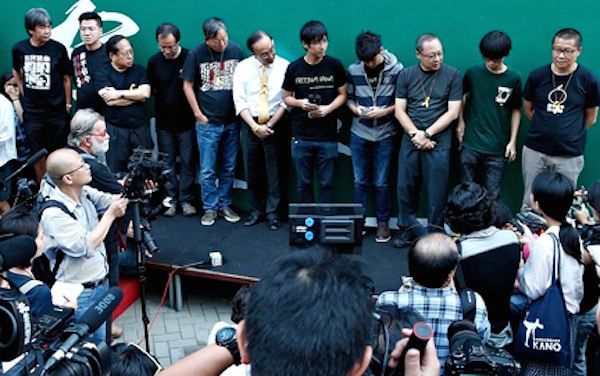Update: With the calling off of negotiations, the crowds have swelled at the multiple protest sites in Hong Kong. Below are photos taken from October 10, 2014 showing the massive crowds.



Hong Kong authorities have called off negotiations with leaders of the pro-democracy “umbrella movement”, accusing them of undermining efforts to break the impasse that has paralysed the city’s main commercial hubs for almost two weeks.
Representatives of the protest movement Occupy Central with Love and Peace, the student groups Scholarism and the Hong Kong Federation of Students, and a group of pro-democracy legislators held a press conference on Thursday near the city government headquarters, where they vowed to begin a “new wave of civil disobedience”.
The demonstrators’ numbers have diminished as many of them returned to work on Monday after a national holiday, but the protest zones remain barricaded, causing traffic jams and angering scores of business owners. At the press conference, student leaders said the protests would continue until the government eased political tensions by addressing the protesters’ main demands, including free elections in 2017.
Joshua Wong Chi-fung, Scholarism’s 17-year-old leader and one of the movement’s figureheads, said students might mobilise a secondary school boycott. Pan-democrats in Hong Kong’s legislature said they would call for the impeachment of the city’s beleaguered chief executive, Leung Chun-ying, and block the government’s financial applications within subcommittees under their control.
Carrie Lam, the city’s chief secretary, cancelled scheduled talks between the government and student groups shortly after the press conference, saying that the students’ remarks had “undermined the basis for a constructive dialogue”, according to the South China Morning Post.
“This is sacrificing public good for their political demand and is against public interests and political ethics,” she said.
Beijing has approved an electoral framework that would effectively bar a democrat from running for chief executive, and has not shown any willingness to budge on the arrangement.
“My feeling is that [the government] wants to drag this out so that the rest of the citizens will be annoyed at the inconvenience, splitting society even further, before they decide what they do,” said Martin Lee, a prominent pro-democracy campaigner and former legislator.
On Wednesday, Australian media reported that Leung had accepted £4m in undisclosed payouts from an Australian engineering firm during his first two years in office. The report said the engineering firm UGL agreed to give Leung the payment as part of its acquisition of DTZ, an insolvent real estate firm that Leung helped lead for many years. Leung’s office has denied that the arrangement was illegal.
John Garnaut, one of the report’s authors, told Voice of America that reporters had been tipped off to the arrangement by an anonymous source last Sunday.
Lee said protesters have been buzzing about the revelation, with many wondering whether the tip had come from Beijing. He said many protesters wanted Leung removed from office, which would allow the government to restart a consultation process on electoral reform.
“He is the most available sacrificial lamb, from Beijing’s point of view,” Lee said. His removal “would be a good way to set aside confrontation between the two sides, and show goodwill.”
A pro-democracy group, the NeoDemocrat party, has lodged a formal complaint with Hong Kong’s anti-corruption watchdog, demanding an investigation into the arrangement, the South China Morning Post reported. The city’s department of justice has said it will field the complaint.
Mainland authorities continue to tightly restrict discussion of the pro-democracy movement on social media. Police have detained dozens of activists countrywide for supporting the protests, including up to a dozen people in Songzhuang, an artist community in western Beijing, who held a pro-umbrella movement poetry recital last week.

